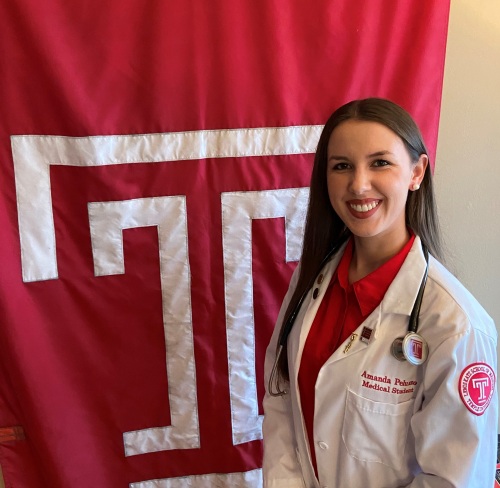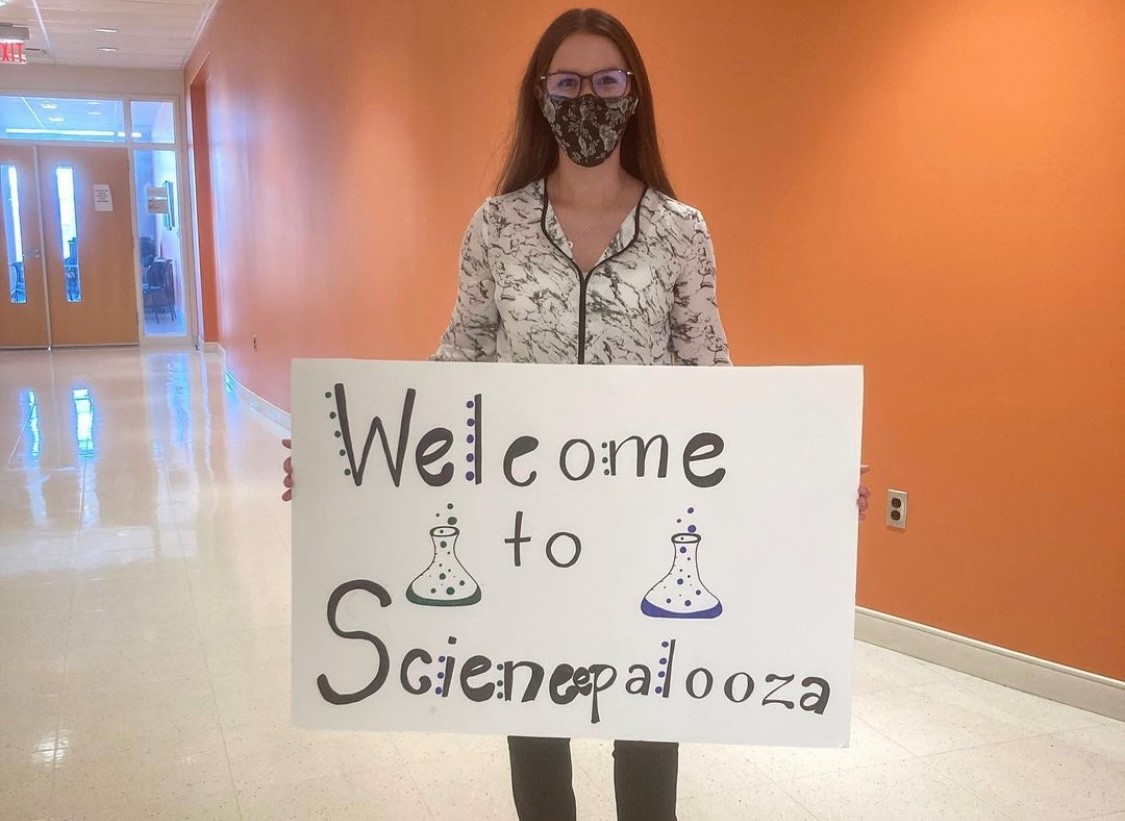Amanda Peluzzo, a third-year MD/PhD student at the Lewis Katz School of Medicine, is a dynamo, who has worked hard to promote future physician research among her classmates.
Two years ago, Peluzzo saw a need to increase the number of opportunities for fellow medical students to present the highlights of their clinically-based research projects. At the same time, she wanted to give students in the audience a chance to network and learn more about the plentiful research pathways at the medical school.
As a result, Peluzzo created Science Palooza, a symposium for second-year medical students, and a similar event, the Future Physician Research Symposium, for third- and fourth-year medical students. Last year's events were held virtually because of the pandemic, but presentations were made in person this fall.
“She showed an incredible amount of initiative,” said Dianne Langford, PhD, Associate Dean for Research at the Katz Medical School. “I think there must be two of her because she gets so much done.”
“Events that have young researchers present their work is very vital, not only to the presenters but also for the audience members, who are potential future researchers,” Peluzzo said.
Each presenter is required to write an abstract that summarizes their hypothesis, methods, results, and the impact on the patient population. Peluzzo helps fellow students learn how to write succinct abstracts, a valuable skill for their future.
“The presenters are permitted only 10 minutes to showcase their work, allowing them to practice what I like to call the 'elevator 'pitch' of their research," Peluzzo said. “It's important for students to be able to summarize their research while being able to convince the audience of the impact on the patient population. If the students can do that, they are well prepared for future scientific endeavors, and especially residency interviews.”
Often, Peluzzo said, she fields questions from presenters about the 5-minute question-and-answer period about how much the audience will know about the research topics. “These events simulate real-life scenarios. It's important to be able to talk about your research on a level that anyone can understand it, which takes a lot of practice,” she said.
At Science Palooza on September 24, second-year medical student Sami Pathak was judged the winner among five presentations for his talk, "Using 3D Printing to Revolutionize External Ventricular Drain (EVD) Placement." On October 22, among the five presenters at the Future Physician Research Symposium, Khyati Somayaji, a third-year medical student, was judged the winner for his presentation, "Psychosocial Support in Older Patients with Metastatic Breast Cancer Treated at a Community Center."

Peluzzo said organizing the events has taught her a lot, too, "about how to help students prepare for their future in research."
In addition to the events, Peluzzo created a research guide. The guide provides the nuts-and-bolts information students need to participate in either clinically based or lab-bench-based research. "We want them to know about it as early in their matriculation as possible," she said, noting the research projects require a longer-term commitment.
Dr. Langford said Peluzzo plays a key role in fostering research awareness among medical students. "Amanda bridges the gap between basic science and clinical research. She has a unique position where she can work back and forth to create more translational research initiatives.”
A Temple University graduate from Northeast Philadelphia with a Bachelor of Science degree in biology, Peluzzo is enrolled in the seven-year MD/PhD program, which offers clinical medicine and basic science research training. Upon graduation, she hopes to pursue a residency at a university hospital, which would allow her to deepen both aspects of her training.
She expects to specialize in cardiology. "Heart disease impacts my family," she said. "My father is a survivor of a major heart attack that led to a triple bypass. He's my inspiration for all of this."
Dr. Langford believes it is crucial for medical students, as future physicians, to understand the value of research. “As they practice medicine”, she said, “they need to think about their expertise and what gaps they might have in their ability to fill and drive better outcomes for their patients.”
There is a movement among medical students both nationally and at Temple to better understand the research that goes into creating treatments for patients. "Medical students are much more eager to find out why a drug works, how the drug works, and how the drug got to where it is, to see all the behind-the-scenes developments to improve treatments of our patients,” Dr. Langford said.
Dr. Langford said there is an emphasis at the Katz School of Medicine on making sure that students are "research-ready" – that they know what research is available for them to do, and that they have taken all the HIPPA and safety training required to do it.
